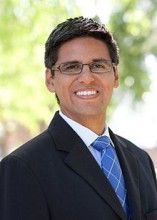Resigning lawmaker Henry Perea takes job with pharmaceutical industry
 Assemblyman Henry Perea, who announced earlier this month his intention to resign from the Legislature, has revealed that he’ll be taking a job with the pharmaceutical industry.
Assemblyman Henry Perea, who announced earlier this month his intention to resign from the Legislature, has revealed that he’ll be taking a job with the pharmaceutical industry.
State law bans the Fresno Democrat from lobbying his former colleagues for one year following his tenure in the state Assembly. Yet, the state’s ban on influence-peddling hasn’t stopped the Pharmaceutical Research and Manufacturers of America from hiring Perea as a senior director of state advocacy. Perea, according to published reports, began talking job prospects with the industry group in September.
Beginning on January 4, Perea will direct political operations in California, Arizona and Nevada for the group known around the Capitol by the acronym PhRMA. The group represents the country’s biggest pharmaceutical and biotechnology companies, including Allergan, Amgen, AstraZeneca, Bayer, Bristol-Myers Squibb, Celgene, Eli Lilly and Company, GlaxoSmithKline, Johnson & Johnson, Merck & Co., Novartis Pharmaceuticals Corporation and Pfizer.
“They innovate, they discover cures, they represent a lot of California employers,” Perea said in an interview with the Los Angeles Times. “The debate in health care, especially after the Affordable Care Act, is going to be very robust over the next decade or two and I look forward to being a part of that.”
PhRMA’s Robust Lobbying Operation
Since Perea’s first term in the state Assembly in 2010, the Pharmaceutical Research and Manufacturers of America has spent big money to lobby the governor, state lawmakers and other state government officials.
A CalWatchdog.com analysis of state lobbying disclosure forms found that Perea’s new employer has spent more than $2.59 million in state lobbying over the past five years. That half-million dollars per year in annual lobbying fees doesn’t include money spent by PhRMA’s member organizations.
Just one PhRMA member, the multinational pharmaceutical giant Pfizer, spent more than $3.18 million in lobbying over the same period, according to CalWatchdog.com’s review of disclosure reports.
Perea’s Campaign Contributions from PhRMA
The pharmaceutical industry’s robust lobbying operation in Sacramento has frequently crossed paths with Perea. Over the course of his career, Perea has accepted $157,144 in campaign contributions from the industry, according to FollowtheMoney.org’s analysis of campaign contributions. That ranks him 119th of every politician in the country and, according to FollowtheMoney.org, means he’s accepted more pharma money than Senate President Pro Tem Kevin de León, Speaker of the Assembly Toni Atkins and former Senate President Pro Tem Darrell Steinberg.
During the 2011-2012 legislative session, the pharmaceutical industry contributed more than $74,000 to Perea’s campaign accounts, making it the second largest industrywide contributor to Perea’s campaign, according to an independent analysis by the transparency group MapLight.
Perea’s multiple campaign committees also appear frequently on campaign finance disclosure reports and political action committee summaries filed by pharmaceutical companies. Earlier this year, his campaign committee for a 2018 Insurance Commissioner campaign accepted $2,000 from Amgen. In 2014, Pfizer gave Perea $3,500 and counted his re-election among its important wins.
“We continue to face significant legislative and regulatory challenges and each election cycle is critical to our industry,” Sally Susman, chair of Pfizer PAC, wrote in its 2014 Pfizer PAC annual report, a 102-page report detailing the company’s effort to build “positive public will.”
Perea’s history of luxury gifts, trips
Although Perea has refused to disclose his new salary, it’s likely to be more than the $97,197 annual salary and $33,000 in annual tax-free per diem payments he received as a member of the state Legislature.
Over the course of his career, Perea supplemented his income with tens of thousands of dollars in luxury goods, entertainment and travel, according to his economic disclosure reports.
 In 2011, Perea accepted $9,397 worth of lodging, meals and transportation for a junket to Italy sponsored by the California Foundation on the Environment and the Economy, “a San Francisco-based nonprofit made up of oil companies, utilities and environmental groups.” Two years later, Perea again accompanied the group on its junket to Eastern Europe – a trip valued at $9,984.
In 2011, Perea accepted $9,397 worth of lodging, meals and transportation for a junket to Italy sponsored by the California Foundation on the Environment and the Economy, “a San Francisco-based nonprofit made up of oil companies, utilities and environmental groups.” Two years later, Perea again accompanied the group on its junket to Eastern Europe – a trip valued at $9,984.
Perea’s biggest haul came last year, when he accepted $16,090 from the group, including a $10,221 trip to Chile. He also traveled to: Maui on a $2,148 trip paid for by the Independent Voter Project, Israel on a $11,550 trip paid for by the American Israel Public Affairs Committee, and Central America on a $1,500 trip paid for by the government of El Salvador.
3rd lawmaker resignation since 2013
Perea will become the third California lawmaker in two years to quit in the middle of a term in order to take a job with a Capitol interest group. In 2013, Democrat State Senator Michael Rubio abruptly quit his position to take a job with Chevron’s government affairs unit. That same year, Republican State Senator Bill Emmerson quit mid-term for a high-paying job with the California Hospital Association.
Perea’s resignation will trigger a 2016 special election that is expected to cost Fresno taxpayers several hundred thousand dollars. The March 2014 special election to fill Emmerson’s seat cost Riverside County taxpayers $415,000, according to the Press-Enterprise.
Two candidates had already announced their intentions to run for the 31st Assembly District: Democrat Joaquin Arambula and Republican Fresno City Councilman Clint Olivier.
Related Articles
GOP 'manifesto' trumps unions
JUNE 14, 2010 By STEVEN GREENHUT A political candidate can take on the public-employee unions in a nasty street rumble
Prop. 30: If it fails, then it holds teacher pay hostage, not kids
Oct. 30, 2012 By Chris Reed Proposition 30’s fading poll prospects have led to redoubled efforts by Gov. Jerry Brown
Looking Back At Absurd State Budget
This article was first published in City Journal. OCT. 28, 2010 By STEVEN GREENHUT Smoke and Mirrors in Sacramento: California’s


